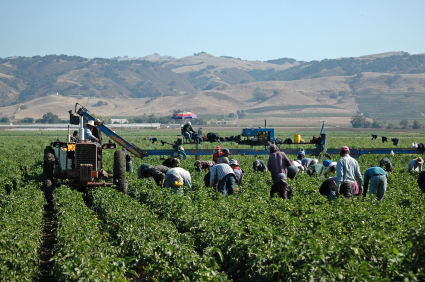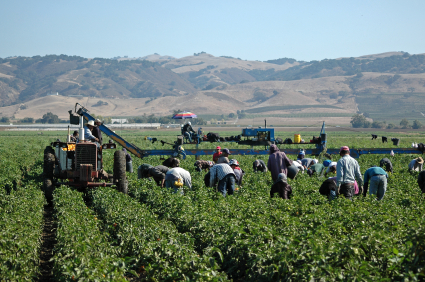 Don’t bite the hand that feeds you.
Don’t bite the hand that feeds you.
Editor’s note: Trace the history of the food on your plate, and you’re likely to find worker abuse. Creating a truly fair food system will be a massive challenge–and not without conflicts. In the spirit of airing those conflicts with the hope of moving forward, we present a piece critical of Chipotle Grill by Sean Sellers of Just Harvest USA. –Tom Philpott
———————-
“Of course I’m not in favor of slavery! But signing an agreement [with the Coalition of Immokalee Workers] does not actually change those conditions for farmworkers,” Steve Ells, CEO of Chipotle Mexican Grill, gibed in front of an audience of 250 at the University of Pennsylvania’s prestigious Wharton School of Business on November 19. “I mean, they just don’t see the bigger picture,” he continued. “To change the fast-food paradigm is huge. We’re trying to do the right thing.”
Ells’ defensive posture came in immediate response to a question posed by Marina Saenz-Luna, a staff member of Just Harvest USA, who works closely with the Florida-based Coalition of Immokalee Workers (CIW). Since 2006, the grassroots farmworker organization has petitioned Chipotle – a leading fast-casual restaurant chain specializing in gourmet burritos – to enter into an agreement to improve wages and working conditions for Florida tomato pickers. Four years later, farmworkers’ and consumers’ stomachs have soured in light of Chipotle’s persistent hostility towards the workers’ organization.
It didn’t have to be this way. Ells founded Chipotle in 1993 with an $85,000 start-up loan from his father. The venture has since bloomed into one of Fortune’s 100 fastest-growing companies with over 800 restaurant nationwide. Along the way, Chipotle has emerged as a self-styled leader in the fields of sustainable agriculture and socially responsible supply chain management through its highly publicized commitment to “Food With Integrity.”
Chipotle explains on its website that, “‘Food With Integrity’ isn’t a marketing slogan.” Rather, it “means working back along the food chain. It means going beyond distributors to discover how the vegetables are grown, how the pigs, cows and chickens are raised, where the best spices come from.” For his part, Ells, the chef-cum-corporate executive, reflects, “Learning about this dark side of modern agriculture made me want to find out how we could do things differently.”
Yet Chipotle has responded to the human rights crisis in Florida’s fields–including seven federally prosecuted cases of modern-day slavery since 1997–with silence, evasion, and cynical spin. And Ells seemingly has no compunction about using his high-profile speaking engagements to spread misinformation about the CIW’s Campaign for Fair Food and the impact of his company’s policies on farmworkers.
What is at stake is not mere public relations dividends or quarrels over the meaning of “integrity.” Chipotle apparently believes that farmworkers are incapable of developing mutually beneficial solutions to the problems they face within the agricultural industry. And though Chipotle is but a tiny player within a massive food industry landscape, their stance flies in the face of core principles painstakingly advanced by the Campaign for Fair Food over the past decade: farmworker participation in the protection of their own labor rights; supply chain transparency; and third-party verification and monitoring.
It’s easy to shut down debate and mock earnest criticism when one stands alone at the podium and holds the microphone. But a closer reading of the recent exchange between Ells and Saenz-Luna belies a festering insecurity within Ells and his company over its chosen course of action.
So here’s my challenge: Let’s have a real debate, Mr. Ells, at any public forum of your choosing. After all, if you can’t back up your position, then integrity demands that you change it.
“Chipotle Challenge” Background:
Human Rights Crisis in U.S. Agriculture
From pesticides to animal confinement operations, public interest in the “dark side of modern agriculture” has exploded over the past decade. This growing awareness – which has immeasurably benefited Chipotle – links our food system to issues of consumer health, ecology, animal welfare, and, occasionally, the livelihoods of small-scale farmers and producers. Broadly speaking, however, labor and human rights have been strictly segregated from the sustainability agenda. Thus it is possible for Chipotle to dream of “revolutionizing the way America grows, gathers, serves and eats its food,” without ever once mentioning the human beings who plant and handpick the majority of our fresh fruits and vegetables.
This is baffling given that three million farmworkers form the base of the trillion-dollar U.S. food industry. In exchange for their backbreaking stoop labor, they receive sub-poverty wages totaling around $10,000 per year. Farmworkers are also excluded from important workplace legal protections, including the right to collective bargaining and the right to overtime pay. Worse still are the brutal forms of abuse that flourish from such retrograde labor relations. In the extreme, workers are forced to toil against their will for little or no pay under the threat or actual use of violence.
In Florida, the human rights crisis engulfing farm labor is perhaps most starkly visible. Tomato pickers have received virtually the same harvesting piece rate since 1980: 40-50 cents for every 32-pound bucket they fill. At this rate, workers must pick and haul a staggering 2.5 tons of tomatoes in order to earn minimum wage for a typical 10-hour day. Decades of class-action lawsuits have exposed a pattern of systematic minimum wage violations, and supervisor violence in the fields is not unheard of.
In November 2007, three farmworkers in Immokalee – the heart of Florida’s winter tomato production – escaped from more than a year of bondage after punching through the ventilation hatch in a box truck where they were held captive by their employers. In total, a dozen workers were forced to pick tomatoes by day and then chained, beaten, and robbed of their pay at night in one of southwest Florida’s “biggest, ugliest slavery cases ever,” according to U.S. Attorney Doug Molloy.
The enslaved crew harvested for farms owned by two of Florida’s largest tomato growers. It was the seventh farm labor slavery case prosecuted by federal civil rights officials since 1997, now involving well over 1,000 workers. All of which brings us to a question posed by Eric Schlosser at last year’s Slow Food Nation conference: “Does it matter whether an heirloom tomato is local and organic if it was harvested with slave labor?”
Farmworkers Forge a Strategy for Change
Since 1993, the Coalition of Immokalee Workers has spearheaded the fight for fair wages and dignified treatment for Florida farmworkers. By tragic necessity, the CIW has also become one of the most respected anti-slavery organizations in the U.S. It has assisted the FBI and Department of Justice in the investigation and prosecution of six of Florida’s seven recent slavery cases. The CIW also trains and writes curriculum for law enforcement on how to combat labor trafficking. For its efforts, the CIW has been recognized by Florida Governor Charlie Crist, FBI Director Robert Mueller, the Robert F. Kennedy Memorial Human Rights Center, and London-based Anti-Slavery International.
Drawing from their experiences, farmworkers began organizing to eliminate the root causes of modern-day slavery through the Campaign for Fair Food. The market-based initiative seeks to improve the tomato harvesting wage floor and institutionalize a voice for farmworkers by requiring large food retailers to demand more humane labor standards from their Florida tomato suppliers, to pay a penny more per pound for more fairly produced tomatoes, and to buy only from growers who meet those higher standards.
The campaign began in 2001 with a boycott of Taco Bell. By mobilizing farmworkers, students, people of faith, and community groups nationwide, the CIW has since reached agreements with some of the largest food retailers in the world: fast-food giants Yum Brands (Taco Bell’s parent) McDonald’s, Burger King, Subway; foodservice providers Compass Group and Bon Appetít; and Whole Foods Market. These companies are now working directly with the CIW and leveraging their buying power to address the human rights crisis in their tomato supply chains.
Progress hit a snag in November 2007 when the Florida Tomato Growers Exchange (FTGE), a powerful industry lobby group, announced that its members would not pass the penny-per-pound bonus onto their harvesters as required by the Fair Food agreements. Without participating growers, the CIW and its buyer-partners agreed to temporarily place the accruing funds into an escrow account until willing growers stepped forward. Meanwhile, the CIW pressed ahead with the campaign in anticipation of the day when the growers’ unified resistance crumbled.
After extensive behind-the-scenes negotiations, three Florida tomato growers were onboard by September 2009, including East Coast Growers, the third-largest producer in the state. Presently the CIW is not only expanding the Campaign for Fair Food into the supermarket and foodservice industries but also implementing the worker-designed code of conduct and verification mechanisms called for by the campaign at these participating farms. U.S. Senator Bernie Sanders heralded the breakthrough as “the beginning of the end of the harvest of shame that has existed for far too long in Florida’s tomato fields.”
Food With Integrity?
Given Chipotle’s vision of “Food With Integrity,” a partnership with an award-winning, internationally-recognized farmworker organization such as the CIW would seem to be a no-brainer. Yet Chipotle refuses to even meet face-to-face with the workers who harvest its tomatoes, much less commit itself to a partnership based on mutual respect. Below is a chronology of Chipotle’s responses to the Campaign for Fair Food:
- Silence: Chipotle buried its head in the sand in the aftermath of the widely publicized 1997 Miguel Flores slavery case – which made national headlines and was featured on the CBS news program 48 Hours – as well as the 2001 launch of the Campaign for Fair Food. The deafening silence continued even after the CIW wrote a letter to Chipotle in February 2006 requesting a meeting to discuss how the precedent-setting agreement with Yum Brands might be adapted to Chipotle’s supply chain.
- “SAFE”: After the Taco Bell/Yum victory in March 2005, farmworkers turned their focus to McDonald’s, who at the time held a majority stake in Chipotle. (“We’ve found the very rich uncle every restaurant wishes it had behind it,” said Ells of the relationship. McDonald’s divested from Chipotle in October 2006.) The CIW launched an “aggressive education campaign” in March 2006 to expose the poverty of farmworkers in the companies’ tomato supply chains.
Following McDonald’s lead, Chipotle announced its support for a grower-controlled monitoring agency called Socially Accountable Farm Employers (SAFE). Devoid of worker participation and created to thwart the progress of the Campaign for Fair Food, SAFE has been thoroughly discredited in both principle and practice. In fact, the two tomato growers implicated in the 2007 Immokalee slavery case were certified by SAFE.
All the while, Chipotle continued to reject dialogue with the CIW. “Just because an activist group doesn’t like what we’re doing, it doesn’t mean there’s something wrong with what we’re doing,” Chipotle spokesperson Chris Arnold explained in 2006.
- Suspend Florida tomato purchases: Chipotle clung to SAFE as the CIW paid its first visit to hometown Denver in September 2006. Realizing that the public relations storm was only intensifying, Chipotle opted for a new approach. It soon announced the suspension of Florida tomato purchases in order to investigate the CIW’s “claims.” The move was immediately decried as an evasive tactic by the Alliance for Fair Food and thirty-six leading labor law scholars. In an open letter, they wrote, “Chipotle’s current course will not result in the elimination of exploitative conditions in your company’s tomato supply chain. At best, it will only further delay long-needed reforms; at worst, it will result in Chipotle supporting even more exploitative conditions than those found in your Florida suppliers’ operations today.”
Even as the CIW reached agreements with McDonald’s and Burger King in 2007 and 2008 respectively, Chipotle maintained this untenable position. In response, Denver Fair Food and the Student/Farmworker Alliance stepped up pressure with large demonstrations at Chipotle’s headquarters in the spring and summer of 2008.
- Go-it-alone: Again sensing the futility of its strategy, Chipotle deployed a more sophisticated response in October 2008. On the eve of the CIW’s cross-country “Chipocrisy Tour,” Chipotle announced its decision to “pay an additional penny per pound for all the tomatoes that it purchases from its Florida suppliers,” and to “pursue tomato suppliers who are not members of the Florida Tomato Growers Exchange and who will pay… the additional penny per pound.” The CIW praised Chipotle’s acknowledgement of farmworker exploitation at long last, but blasted the non-binding solution.
“As farmworkers – the human beings actually suffering the poverty wages and labor abuses every day in the fields – we have no role in Chipotle’s plan,” explained Gerardo Reyes of the CIW. “Under their plan, Chipotle will review its own code of conduct and decide if any changes are appropriate, Chipotle will oversee its own payments under its penny per pound plan, and Chipotle will verify its own compliance with the changes it is proposing. That’s just not credible. Transparency, verification, and participation are essential elements of the agreements we have reached with other fast-food leaders, and they are essential elements in any defensible definition of social responsibility.”
Dissecting Chipotle’s Latest Ploy
Predictably, Chipotle’s decree did not mollify critics. In June 2009, the burrito chain came under renewed scrutiny when more than 30 leading sustainable food advocates released on open letter describing, “the CIW’s struggle for dignity as a non-negotiable part of the struggle for a sustainable food system.” The signatories strongly urged Chipotle to enter into an agreement with the worker-led organization as soon as possible.
Then came the Food, Inc. fiasco. Underestimating the potential blowback, Chipotle moved forward with its high-profile marketing tie-in with the acclaimed documentary about the U.S. food system. (Robert Kenner, the film’s director, and Eric Schlosser, its co-producer, both signed the open letter to Chipotle a month earlier.) In turn, Fair Food activists held educational actions at dozens of Chipotle-sponsored Food, Inc. screenings across the country. What should have been a public relations coup backfired amidst yet another round of questions over Chipotle’s refusal to partner with the CIW.
In desperate need of favorable publicity, Chipotle then did something truly audacious: it claimed sole credit for the September 2009 breakthrough with East Coast Growers. On one level, this can be viewed as typical public relations gamesmanship. Robert McGoey of Denver Fair Food reasons, “While Chipotle may have been involved in a multi-party process that brought about the East Coast decision, there is no disputing the fact that Chipotle was – by far – the smallest piece of the puzzle. And yet, Chipotle was the only company to jump out alone and shout from the highest mountain, ‘Look what I did!'”
On a deeper level, there is a a cynical distortion of reality in the announcement that supposedly validates Chipotle’s “go-it-alone” approach. What allowed East Coast to break away from the FTGE and risk exile in its own industry was precisely the CIW’s signed agreements with other fast-food and foodservice companies. Those agreements require retail food giants to purchase from any grower who participates in the penny-per-pound program and complies with the CIW code of conduct. There is no disputing that the total market share of all the signed companies – over 65,000 restaurants compared to Chipotle’s 830 – was the deciding factor for East Coast.
Simply put, without those agreements, there would be no demand supporting the Fair Food principles and thus no incentive for East Coast to step up to the higher standards. In this sense, it is absolutely the signing of agreements with the CIW that makes change in Florida farm labor conditions possible. Chipotle, despite its claims to the contrary, is coasting on the hard work and market bulk of these companies.
The Chipotle Challenge
Which brings us back to Steve Ells’ quotation at the top of this story: “But signing an agreement [with the CIW] does not actually change those conditions for farmworkers.”
Like most everything else Ells has said about the CIW and the Campaign for Fair Food, this is entirely backwards, and so painfully wrong. But this time, his misinformation will not go unchallenged.
Mr. Ells, consider this my formal challenge to a public debate on the merits of the Campaign for Fair Food. Have the conviction of your beliefs and join me for a debate – you name the time and place, anytime, anywhere. The clock is ticking.



